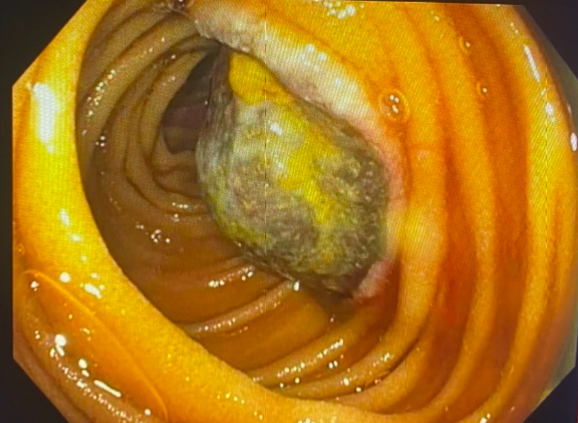Tuesday Poster Session
Category: Small Intestine
P6254 - Duodenal Arteriovenous Malformation: An Unmasked Source of Life-Threatening Gastrointestinal Bleeding in Metastatic Melanoma
Tuesday, October 28, 2025
10:30 AM - 4:00 PM PDT
Location: Exhibit Hall
- OK
Osama Sherjeel Khan, MD (he/him/his)
Cleveland Clinic Florida
Weston, FL
Presenting Author(s)
Sheraz Khan, MBBS1, Anas Khouri, MD2, Osama Sherjeel Khan, MD2
1Khyber Medical College, Swat, North-West Frontier, Pakistan; 2Cleveland Clinic Florida, Weston, FL
Introduction: In metastatic melanoma with GI spread, bleeding usually is due to tumor erosion. We report an instance where capsule endoscopy surprisingly found a bleeding arteriovenous malformation (AVM)—not metastatic mass—to be responsible for life-threatening bleeding, refuting diagnostic presumptions.
Case Description/
Methods: A 64-year-old woman with metastatic melanoma (hepatic/intestinal, on immunotherapy), anemia, and psychiatric comorbidities was transferred for refractory GI bleeding following failure of standard workup. Initial presentation included hematochezia/melena, Hgb 6.8 g/dL, requiring 6 units of PRBCs . Previous CT abdomen revealed jejunoileal intussusception; colonoscopy was done and showed luminal blood but no active bleeding.
Transfer Findings revealed a tachycardic patient(HR 112), with a post-transfusion Hgb of 8.3 g/dL.
Capsule endoscopy showed proximal duodenal arteriovenous malformation that was bleeding(unanticipated source). The AVM was ablated during EGD with argon plasma cogulation (APC) and the bleeding was stopped. Push enteroscopy revealed a 2.5 cm fungating jejunal mass(metastatic melanoma) but with no active bleeding, as had initially been suspected.
Discussion: Suspected metastatic bleeding can mask associated vascular disease. This can lead to delay in diagnosis and result in life-threatening hemorrhage. Advanced endoscopic techniques (such as capsule endoscopy) are necessary for detection of non-oncologic sources of bleeding in patients with cancer. Argon plasma coagulation (APC) can serve to achieve hemostasis in life-threatening GI bleeding without needing surgery.
AVMs must be considered and actively sought out in immunotherapy-treated melanoma patients because of possible angiogenic influences. Early advanced endoscopic techniques avoid unnecessary delay in diagnosing curable non-malignant lesions, thereby decreasing transfusion dependency and directing proper therapy.

Figure: Metastatic melanoma in small intestine
Disclosures:
Sheraz Khan indicated no relevant financial relationships.
Anas Khouri indicated no relevant financial relationships.
Osama Sherjeel Khan indicated no relevant financial relationships.
Sheraz Khan, MBBS1, Anas Khouri, MD2, Osama Sherjeel Khan, MD2. P6254 - Duodenal Arteriovenous Malformation: An Unmasked Source of Life-Threatening Gastrointestinal Bleeding in Metastatic Melanoma, ACG 2025 Annual Scientific Meeting Abstracts. Phoenix, AZ: American College of Gastroenterology.
1Khyber Medical College, Swat, North-West Frontier, Pakistan; 2Cleveland Clinic Florida, Weston, FL
Introduction: In metastatic melanoma with GI spread, bleeding usually is due to tumor erosion. We report an instance where capsule endoscopy surprisingly found a bleeding arteriovenous malformation (AVM)—not metastatic mass—to be responsible for life-threatening bleeding, refuting diagnostic presumptions.
Case Description/
Methods: A 64-year-old woman with metastatic melanoma (hepatic/intestinal, on immunotherapy), anemia, and psychiatric comorbidities was transferred for refractory GI bleeding following failure of standard workup. Initial presentation included hematochezia/melena, Hgb 6.8 g/dL, requiring 6 units of PRBCs . Previous CT abdomen revealed jejunoileal intussusception; colonoscopy was done and showed luminal blood but no active bleeding.
Transfer Findings revealed a tachycardic patient(HR 112), with a post-transfusion Hgb of 8.3 g/dL.
Capsule endoscopy showed proximal duodenal arteriovenous malformation that was bleeding(unanticipated source). The AVM was ablated during EGD with argon plasma cogulation (APC) and the bleeding was stopped. Push enteroscopy revealed a 2.5 cm fungating jejunal mass(metastatic melanoma) but with no active bleeding, as had initially been suspected.
Discussion: Suspected metastatic bleeding can mask associated vascular disease. This can lead to delay in diagnosis and result in life-threatening hemorrhage. Advanced endoscopic techniques (such as capsule endoscopy) are necessary for detection of non-oncologic sources of bleeding in patients with cancer. Argon plasma coagulation (APC) can serve to achieve hemostasis in life-threatening GI bleeding without needing surgery.
AVMs must be considered and actively sought out in immunotherapy-treated melanoma patients because of possible angiogenic influences. Early advanced endoscopic techniques avoid unnecessary delay in diagnosing curable non-malignant lesions, thereby decreasing transfusion dependency and directing proper therapy.

Figure: Metastatic melanoma in small intestine
Disclosures:
Sheraz Khan indicated no relevant financial relationships.
Anas Khouri indicated no relevant financial relationships.
Osama Sherjeel Khan indicated no relevant financial relationships.
Sheraz Khan, MBBS1, Anas Khouri, MD2, Osama Sherjeel Khan, MD2. P6254 - Duodenal Arteriovenous Malformation: An Unmasked Source of Life-Threatening Gastrointestinal Bleeding in Metastatic Melanoma, ACG 2025 Annual Scientific Meeting Abstracts. Phoenix, AZ: American College of Gastroenterology.
